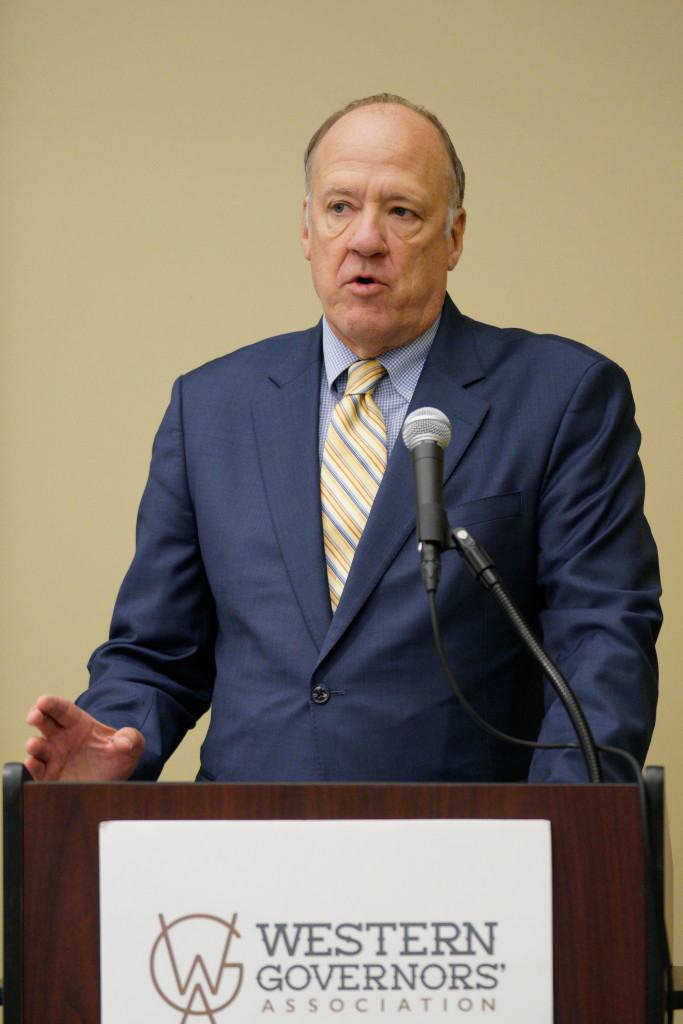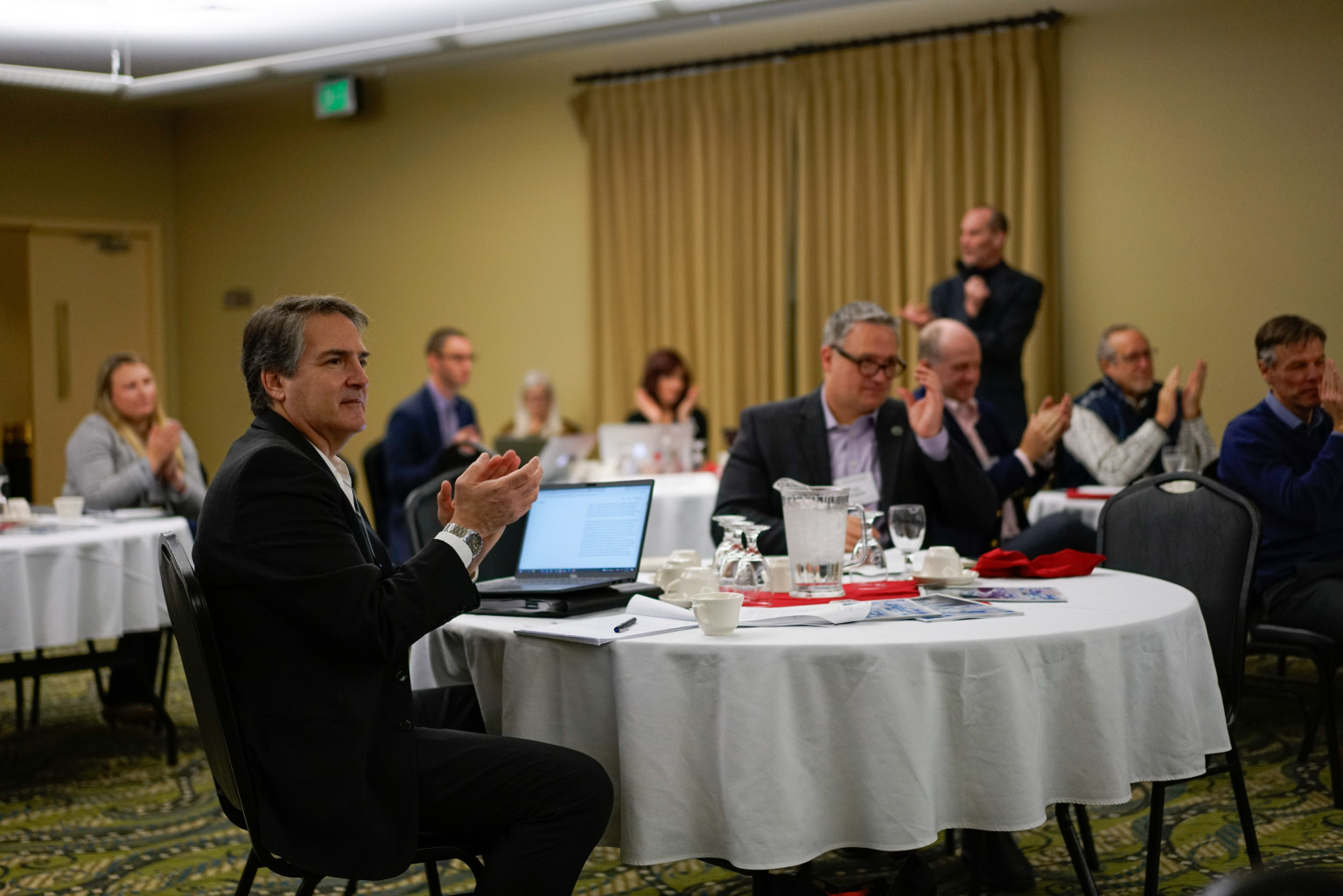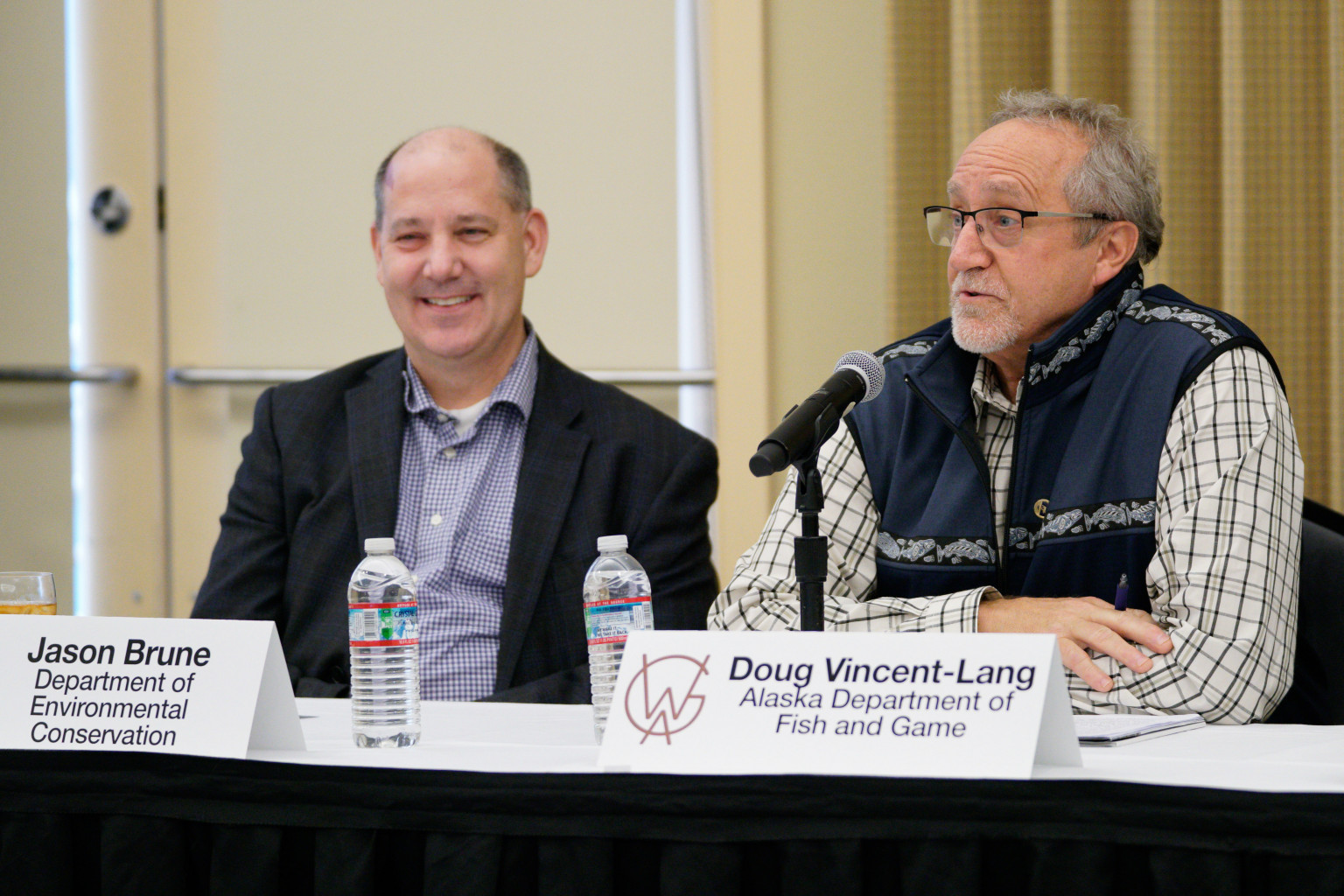11/03/21
WATCH: Alaska Gov. Mike Dunleavy highlights the importance of sustainable resource production at WGA’s ‘Working Lands, Working Communities’ workshop
Gov. Mike Dunleavy emphasized the importance of sustainable resource development in opening remarks at the Alaska workshop for the 'Working Lands, Working Communities Initiative.' During his keynote address, he also urged the federal government to streamline permitting processes so that states can effectively leverage their natural resources for community benefit and avoid businesses outsourcing production to foreign countries. The workshop for the central policy effort of WGA Chair, Idaho Gov. Brad Little, also included conversations about rural workforce capacity, water quality, forest management and tourism.
You can view recordings of all seven roundtable discussions from the Alaska workshops by clicking the links below.
Gov. Mike Dunleavy emphasized the importance of sustainable resource development
 WATCH: Introductory Remarks by Colorado Gov. Mike Dunleavy: After being introduced by WGA Executive Director Jim Ogsbury, who noted that “working lands are not a passing interest or secondary issue,” for Gov. Dunleavy, “they speak directly to who he is,” the Governor focused much of his keynote address on the huge potential for resource development in Alaska – especially critical minerals needed for solar panels, batteries and electric vehicles – and the state’s record of sustainable management. “Resources have always been the cornerstone of this great country,” he said. “America could be the country that underwrites the new energy economy because of our massive amount of strategic metals… If you want to make sure the environment remains intact, you don’t push your industries over to foreign counties that don’t have the environmental regulations that Alaska and the United States have.”
WATCH: Introductory Remarks by Colorado Gov. Mike Dunleavy: After being introduced by WGA Executive Director Jim Ogsbury, who noted that “working lands are not a passing interest or secondary issue,” for Gov. Dunleavy, “they speak directly to who he is,” the Governor focused much of his keynote address on the huge potential for resource development in Alaska – especially critical minerals needed for solar panels, batteries and electric vehicles – and the state’s record of sustainable management. “Resources have always been the cornerstone of this great country,” he said. “America could be the country that underwrites the new energy economy because of our massive amount of strategic metals… If you want to make sure the environment remains intact, you don’t push your industries over to foreign counties that don’t have the environmental regulations that Alaska and the United States have.”
WATCH: Roundtable I – Recreation and Tourism Challenges in Accessing Public Lands
This panel delved into the challenges that some gateway communities have accessing their local public lands due to forest landlocking. Discussion included how better land planning can increase recreation and tourism opportunities for those areas.
Robert Venables, Executive Director, Southeast Conference: “We need a better method of dispersing visitors based on data. You can’t effectively manage what you’re not measuring”
Sarah Leonard, President & CEO, Alaska Travel Industry Association: “One of the things we’ve suggested…is a one-stop-shop for permitting. That would be a huge success for tourism industry businesses and land managers.”
WATCH: Roundtable II – Rural Workforce Capacity:
Remote communities, like many in Alaska, require the importation of out-of-town personnel to fulfill workforce capacity needs. This panel examined successful capacity-building strategies, how COVID restrictions on travel impacted natural resource sector workers, and how communities are recovering their workforce.
 Mike Satre, Director of Governmental Affairs, Hecla Mining: “Yes there’s a shortage in the workforce. We’re having to rapidly respond in how we recruit and build compensation packages.”
Mike Satre, Director of Governmental Affairs, Hecla Mining: “Yes there’s a shortage in the workforce. We’re having to rapidly respond in how we recruit and build compensation packages.”
Dan Robinson, Research Chief, Alaska Department of Labor: “Chaos creates opportunity”
Sonya Skan, Deputy Director. Education & Training Department, Ketchikan Indian Community: “When we talk about workforce capacity, we have a lot of people at their lowest and have lost a lot. If we’re not helping them feel important and like they have something to offer, who is? As leaders, we have to draw that out and it’s one of the most important things we can do.”
Michelle O'Brien, Executive Director, Ketchikan Chamber of Commerce: “With the pandemic, more people are willing to move, and Alaska is very appealing. Why not look at building the local workforce by bringing in talented people who are trying to move?”
WATCH: Roundtable III – The Future of Mineral Production and Dependent Economies
In February of 2021, the Biden Administration released an Executive Order on America’s Supply Chains resulting in blueprints for securing the domestic supply of certain critical minerals. This panel discussed how mineral resource-dependent communities and their economies will be impacted by changing land planning, permits and mineral production.
Mike Satre, Director of Governmental Affairs, Hecla Mining: “There is no on/off switch to mineral development. We have to be attracting investment into Alaska right now in order to realize that investment in a few years.”
Jason Brune, Commissioner, Department of Environmental Conservation: “While it can be seen as a negative, taking 7 to 10 years to develop a mine, I look at it from a positive perspective. We’re doing it right, we’re making sure investors are putting their money into places that are caring for the environment”
WATCH: Roundtable IV- Building a Resilient Long-term Timber Supply:
Actively managed working forests are often a major part of a sustainable rural economic base. Federal lands constitute a large portion of the land base in most western states. Pressure from conservation organizations has greatly reduced timber management and wood supply on federal lands, and this trend is likely to continue. This panel explored how to marshal the resources of private, state and local landownerships to provide the reliable long-term timber supply necessary to maintain a thriving timber industry in local communities.
Laura Schweitzer, Executive Director of the Council of Western State Foresters: “One of the most pressing issues we focus on is sustainable forest management and the link to healthy forests and the communities that rely upon them”
Helge Eng, State Forester for the State of Alaska: “There is not enough money in the economy for the government to pay for projects. We need to stop looking at what we need from the government and start treating them as business ventures that have to pencil out”
Tessa Axelson, Executive Director for the Alaska Forest Association: “Conservation, protection, and sustainability of our forests is what’s going to allow us to be productive in the long term.”
Robert Venables, Executive Director for the Southeast Conference: “We have to have a timber management paradigm that integrates both old-growth and second-growth trees.”
WATCH: Roundtable V – Fisheries and Local Water Resource Management
This panel examined how fishing communities balance their economic needs with maintaining healthy wildlife populations and water quality. Panelists discussed the relationship between fishing, water and terrestrial management plans, and how fisheries are incorporated into resource planning.
 Kyle Moselle, Executive Director, Alaska Department of Natural Resources, Office of Project Management and Permitting: "Intra-government and inter-government coordination is critical in this modern time"
Kyle Moselle, Executive Director, Alaska Department of Natural Resources, Office of Project Management and Permitting: "Intra-government and inter-government coordination is critical in this modern time"
Doug Vincent-Lang, Commissioner, Alaska Department of Fish and Game: Alaska’s fisheries are the best-managed fisheries in the world and are a cornerstone of the economy of this state”
Jason Brune, Commissioner, Department of Environmental Conservation: “Development of our natural resources and environmental protection are not mutually exclusive”
WATCH: Roundtable VI – Supporting Tribal Engagement in Long-Term Agreements
Tribal lands share their borders with state and federal as well as private lands. Incorporating tribal perspectives and knowledge from the beginning of project planning is essential for maintaining successful long-term efforts, but many potential partners do not know how to productively engage with tribes. Panelists conversed about the barriers and strategies for supporting tribes and early, meaningful collaboration.
Kristi Harper, Acting NRCS National Tribal Liaison Officer, USDA Natural Resources Conservation Service: “Tribal conservation districts are a tool for building partnerships and facilitating natural resource work.”
WATCH: Roundtable VII – Overcoming Barriers to Cross-boundary Land Use Planning
Federal lands have varying designations and purposes, resulting in vast differences in management needs and planning goals. Panelists examined how bordering landowners can understand and integrate the unique needs associated with land planning around specifically designated management areas. Moderated by Rodney Dial, Mayor of Ketchikan Gateway Borough.
Trey Acteson, CEO of Southeast Alaska Power Agency: If administrations keep changing the rules on you, it makes it challenging to manage your risk effectively. From a renewable energy perspective, hydro needs to be viewed as an equal to other renewables. Solar and wind have had huge subsidies over the years.
Travis Million, CEO of Copper Valley Electric Association: “Coordination between state and federal agencies of similar type is very helpful from the standpoint of permitting timelines”
Ed Cushing, Division Manager of KPU Telecommunications: “How do you compete with people across the planet when you can’t get permits to build your facilities?
Take a Survey about the Workshop
WGA has created a survey that allows virtual attendees of the Utah workshop to offer comments on the panel presentations and provide input on the issues the initiative is examining.
Please provide your comments and input on the panel discussions. Preferably, the survey would be completed by Sept. 30, but WGA will accept responses after that date. You do not need to answer every question to submit your survey. You may answer “Not Applicable” or leave the response blank.
Please Note: Incomplete surveys cannot be saved and finished later. We recommend that you read all the questions before you begin entering responses.